8 Top Best Practices For Ecommerce Customer Service
Explore the crucial role of ecommerce customer service. Learn strategies to enhance customer satisfaction, promoting growth and success in online retail.

Explore the crucial role of ecommerce customer service. Learn strategies to enhance customer satisfaction, promoting growth and success in online retail.

Providing exceptional customer service is essential for the success of any ecommerce business. 90% of American shoppers use customer service as a deciding factor in whether to do business with a company. It’s important to go beyond to meet their needs and exceed their expectations with customers having endless options at their fingertips.
Ecommerce customer service involves more than just responding to emails and processing returns. It’s about building relationships with customers, addressing their concerns promptly and creating a positive shopping experience that will keep them coming back for more.
Here we’ll delve into the key aspects of ecommerce customer support and provide tips on how to deliver outstanding support to online shoppers. Implementing these strategies allows businesses to set their ecommerce business apart from the competition and cultivate long-lasting relationships with customers.
Ecommerce customer service refers to the support and assistance provided to customers who are shopping online. It includes answering inquiries, resolving issues, processing returns or exchanges and ensuring a positive shopping experience for the customer. Ecommerce businesses need to have strong customer service practices in place to build trust and loyalty with their customers.
Customer service is often seen as an essential component of any successful business, but why exactly does it matter? Here are five proven stats that show why customer service is crucial for the success of any business:
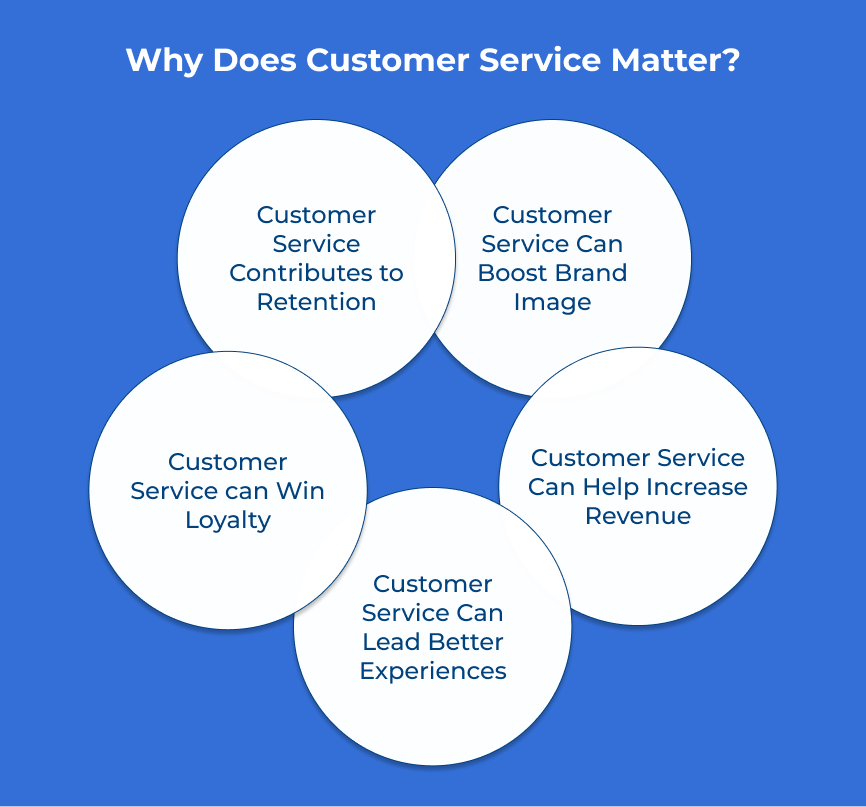
1. According to research conducted by American Express, 81% of consumers say that the key factor in deciding to do business with a company is their level of customer service. It means that providing excellent customer service can lead to increased customer loyalty and repeat business.
2. A study by Zendesk found that 88% of consumers have been influenced by an online customer service review when making a buying decision. It means that providing excellent customer service can lead to free marketing and new customers.
3. Research by Bain & Company found that increasing customer retention rates by just 5% can lead to an increase in profits of 25% to 95%. It shows that investing in customer service can lead to higher revenue and a healthier bottom line.
4. According to a study conducted by HubSpot, 93% of customers are more likely to make repeat purchases with a company that offers excellent customer service. It means that by providing great customer service, businesses can improve customer satisfaction and increase the likelihood of repeat business.
5. A study by NewVoiceMedia found that 51% of customers will never do business with a company again after just one negative customer service experience. It highlights the importance of providing excellent customer service to stay ahead of the competition.
E-commerce has become an essential part of the retail industry, with more and more people choosing to shop online for convenience. The importance of ecommerce customer service has also increased with the rise in online shopping. Here are five reasons why ecommerce customer support is important:
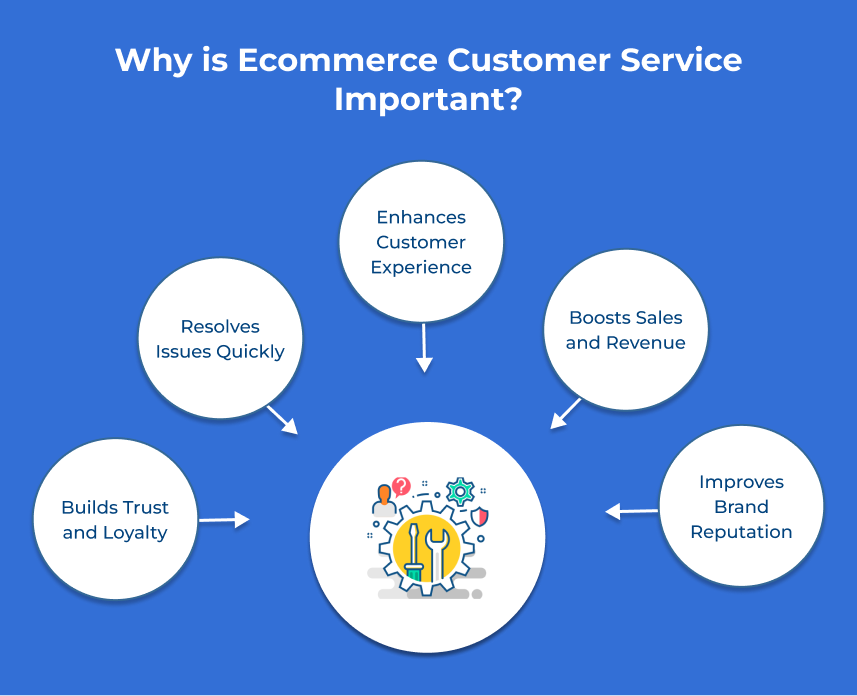
1. Builds trust and loyalty: Providing excellent customer service in ecommerce helps build trust and loyalty with customers. When customers have a positive experience with the brand, they are more likely to return for future purchases and recommend the business to others.
2. Resolves issues quickly: Issues can arise with orders, deliveries, payments or products. Having efficient ecommerce customer service in place allows for these issues to be resolved quickly and effectively. It also helps maintain customer satisfaction and prevent any negative reviews or feedback.
3. Enhances customer experience: Good ecommerce customer service enhances the overall shopping experience for customers. Providing personalized support and offering assistance throughout the purchasing process allows businesses to make the shopping experience more enjoyable.
4. Boosts sales and revenue: Happy customers are more likely to make repeat purchases and spend more money on the website. Delivering excellent customer service allows businesses to increase customer satisfaction, encourage repeat business and ultimately boost sales. 82% of customers will spend more money on brands that deliver great online service.
5. Improves brand reputation: Customer service plays a crucial role in shaping a brand’s reputation. Positive interactions with customers can help build a positive image for the brand, while negative experiences can damage reputation.
We have compiled a list of the top 10 best practices to follow to elevate ecommerce customer service. Implementing these strategies allows businesses to ensure that their customers have a positive shopping experience and keep coming back for more.
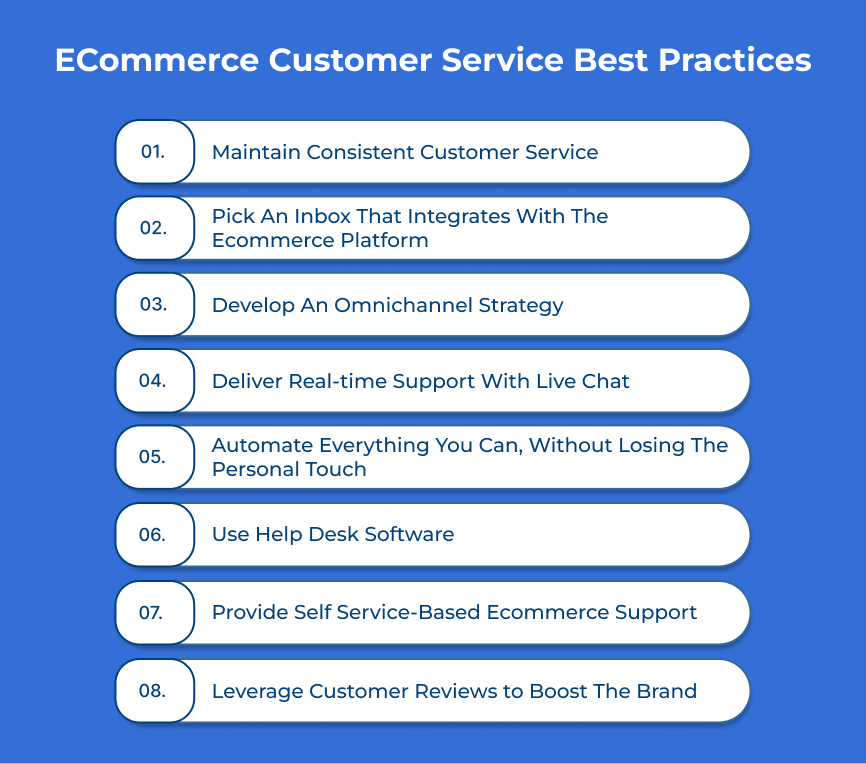
Consistent customer service is essential for maintaining strong customer relationships and building brand loyalty in the competitive world of ecommerce. Consistently delivering high-quality service allows businesses to ensure customer satisfaction and increase customer retention rates. One way to provide excellent ecommerce customer service is to maintain consistency in all customer interactions.
Consistency helps build trust and reliability with customers, making them feel valued. Let’s take an example of a clothing store that consistently responds to customer inquiries within 24 hours and resolves any issues promptly. It will likely see an increase in repeat purchases and positive customer reviews.
Ways to implement:
When it comes to providing excellent ecommerce customer service, one crucial strategy is to pick an inbox that integrates with the ecommerce platform. It means choosing a customer service inbox that seamlessly integrates with the ecommerce platform. It allows businesses to efficiently manage and respond to customer inquiries directly from the ecommerce dashboard.
Integrating customer service inboxes with ecommerce platforms allows businesses to streamline communication with customers and increase response times. It also provides a more personalized and efficient customer service experience. The level of integration also allows businesses to easily access relevant customer data enabling businesses to provide more tailored and effective assistance to each customer.
Ways to implement:
Developing an omnichannel strategy is crucial for providing excellent eCommerce customer service. The strategy involves seamlessly integrating all available channels such as social media, email and mobile apps, to create a unified customer experience. Omnichannel customer engagement increases average sales revenue 9.5%.
Let’s take an example of a customer that might browse products on a company’s website. He may receive personalized product recommendations via email and then purchase through the company’s mobile app. The customer’s preferences and shopping history are seamlessly integrated across all channels, providing a cohesive experience with an omnichannel strategy in place.
Ways to implement:
Live chat is a powerful tool for delivering real-time support to customers on ecommerce websites. The strategy allows businesses to communicate with customers instantly, providing immediate assistance and resolving issues quickly. Customers no longer have to wait for email responses or spend time on hold on the phone. They can get their questions answered and problems solved in real-time, leading to higher customer satisfaction.
Let’s take an example of a customer is having trouble placing an order on an ecommerce website. They can easily reach out to a customer service representative who can guide them through the process step by step with live chat, ultimately resulting in a successful transaction.
Ways to implement:
One effective strategy to achieve this is to automate everything businesses can, without losing the personal touch. It means utilizing automation tools to streamline processes while still ensuring a personalized experience for each customer. Automating repetitive tasks such as order confirmation emails, shipping notifications and customer feedback requests can save time.
Let’s explore an example of a customer service chatbot that can quickly answer frequently asked questions. It should always offer the option to speak with a live agent for more personalized assistance. The approach demonstrates efficiency and responsiveness, while still providing a human touch when needed.
Ways to implement:
Help desk software is a crucial tool in providing excellent ecommerce customer service. The software allows businesses to efficiently manage customer inquiries, provide timely responses and track customer interactions. Delivering exceptional customer service can set a business apart from its competitors and build customer loyalty. In the case of high-growth service teams, as many as 51% depend on help desk systems.
A use case for help desk software would be a customer reaching out with a query about an order. The customer service agent can quickly access the customer’s order information, provide a personalized response and resolve the issue on time.
Ways to implement:
Self-service-based ecommerce support is significant in providing excellent customer service as it empowers customers to find help quickly and efficiently. It leads to higher customer satisfaction and loyalty. Offering self-service options allows businesses to reduce the workload on their customer support team and improve overall efficiency.
Let’s take an example of a clothing retailer that could implement a self-service help center on their website. It helps customers to find sizing information, return policies and answers to frequently asked questions without needing to contact customer support.
Ways to implement:
Customer reviews can have a powerful impact on the brand’s reputation and success in the world of ecommerce. Leveraging customer reviews to boost the brand is a key strategy in providing excellent ecommerce customer service. 66% of consumers stated many online reviews make them trust a brand online.
Responding to both types of feedback shows that the business values customer feedback and is committed to providing exceptional service. One use case of leveraging customer reviews is by featuring them prominently on the website or product pages. It helps potential customers make informed purchasing decisions based on the experiences of others.
Ways to implement:
Providing exceptional customer service can lead to increased customer loyalty, positive reviews and higher sales. Here are five examples of ecommerce brands that are focusing on customer service and reaping the benefits:
Zappos is often cited as a shining example of exceptional customer service in the e-commerce world. The company is known for its 24/7 customer service hotline, free shipping and generous 365-day return policy. Zappos goes beyond to ensure that its customers have a positive shopping experience and it has paid off in terms of customer loyalty.
Amazon has set the standard for customer service in the e-commerce industry. The company offers a wide range of customer service options, including phone, email and live chat support. Amazon also has a reputation for fast shipping and hassle-free returns, making it easy for customers to shop with confidence. Amazon has a robust customer review system that helps shoppers make informed purchasing decisions.
Warby Parker is an e-commerce eyewear company that has built a loyal customer base by offering exceptional customer service. The company offers free shipping and returns, as well as a 30-day trial period for customers to try on glasses at home. Warby Parker also has a dedicated customer service team that is responsive and helpful, ensuring that customers have a positive experience from start to finish.
Chewy is an e-commerce pet supply company that has earned a reputation for outstanding customer service. The company offers 24/7 customer support, fast shipping and a generous return policy. Chewy also goes the extra mile by sending personalized gifts to customers on special occasions such as their pet’s birthday. The level of attention to detail and care has helped Chewy build a loyal customer base.
Casper is an ecommerce mattress company that has gained a following for its exceptional customer service. The company offers a 100-night trial period for customers to test out their mattresses, as well as free shipping and returns. Casper also provides excellent customer support through phone, email and live chat, ensuring that customers have a positive shopping experience from start to finish.
Customer service is a crucial aspect of any ecommerce business. It’s important to invest in the right customer service software to streamline and enhance the customer service process. Here are five essential features to look for in ecommerce customer service software:

1. Live chat support: Live chat support allows customers to communicate with a support representative in real-time. The feature is essential for addressing customer inquiries quickly and efficiently. Live chat support allows customers to get immediate assistance with any issues they may have. It leads to a 48% increase in revenue per chat hour and a 40% increase in conversion rate.
2. Automated responses: Automated responses can help alleviate the workload of customer service representatives by providing instant responses to common customer queries. The feature can also help customers find answers to their questions outside of business hours, ensuring that customers receive timely assistance at all times.
3. Ticketing system: A ticketing system helps organize and prioritize customer inquiries by creating tickets for each customer issue. The feature allows customer service representatives to easily track and manage customer inquiries, ensuring that no customer concern falls through the cracks.
4. Knowledge base: A knowledge base is a library of resources that provides customers with self-service options to find answers to common questions and issues. Providing customers with a knowledge base allows businesses to empower them to find solutions to their problems independently, reducing the need for direct customer support.
5. Integration With ecommerce platforms: It’s important to choose a customer service software that integrates with the ecommerce platform to provide a seamless customer service experience. The integration allows customer service representatives to access customer order history, tracking information and other important details to provide personalized support.
Providing excellent customer service is crucial for any ecommerce business to succeed. It’s more important than ever to ensure that the customer service team is well-trained and equipped to handle any customer inquiries or issues effectively. Here are five ecommerce customer service training programs and their significance:
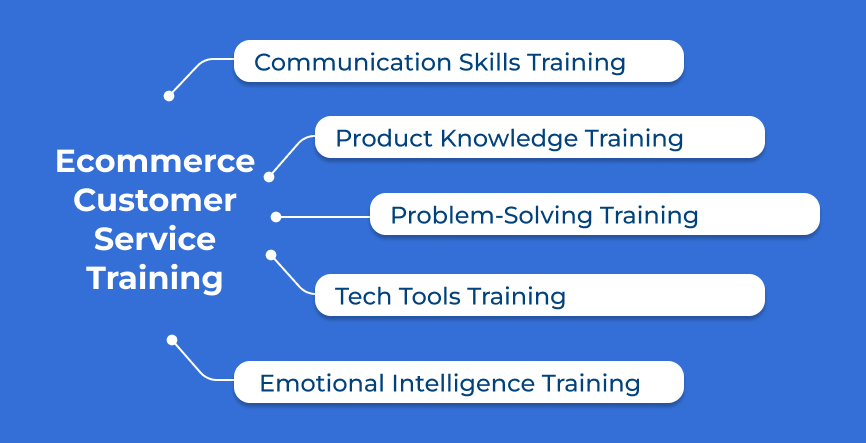
Effective communication is the foundation of good customer service. Training in communication skills helps customer service representatives to listen attentively, express themselves clearly and empathize with customers.
The training also covers how to handle difficult customers and professionally resolve conflicts. Communication skills training helps customer service representatives to build rapport with customers, understand their needs and provide personalized solutions to their problems.
Customers often have specific questions about products, features or specifications. Product knowledge training equips customer service representatives with the information they need to answer these questions accurately and confidently.
Having a deep understanding of the products or services the ecommerce business offers helps customer service representatives to provide accurate information to customers. It makes product recommendations and upsells or cross-sells additional products.
Customer service representatives in ecommerce often encounter complex or challenging issues that require quick thinking and problem-solving skills. Training in problem-solving helps them to identify the root cause of a problem, explore possible solutions and make decisions on how to resolve it.
Problem-solving training equips customer service representatives with the skills to handle customer complaints, technical issues and other problems efficiently. It leads to higher customer satisfaction and loyalty.
Ecommerce customer service teams rely on various tech platforms to manage customer inquiries, track orders and provide support. Training in tech tools ensures that customer service representatives are proficient in using these tools effectively.
Tech tools training helps customer service representatives to streamline processes, save time and deliver a seamless customer experience. It also allows them to access customer information quickly and efficiently.
Emotional intelligence is the ability to manage emotions, both in oneself and others. Training in emotional intelligence helps customer service representatives stay calm under pressure, empathize with customers and build strong relationships.
Emotional intelligence training enables customer service representatives to handle stressful situations, de-escalate conflicts and provide a positive customer experience. It also helps them to understand customers’ emotions and respond appropriately to their needs.
When it comes to running an ecommerce business, providing top-notch customer service is essential for success. There are many tools available to help streamline the customer service process and keep customers happy. Here are five of the best customer service tools to use for ecommerce:
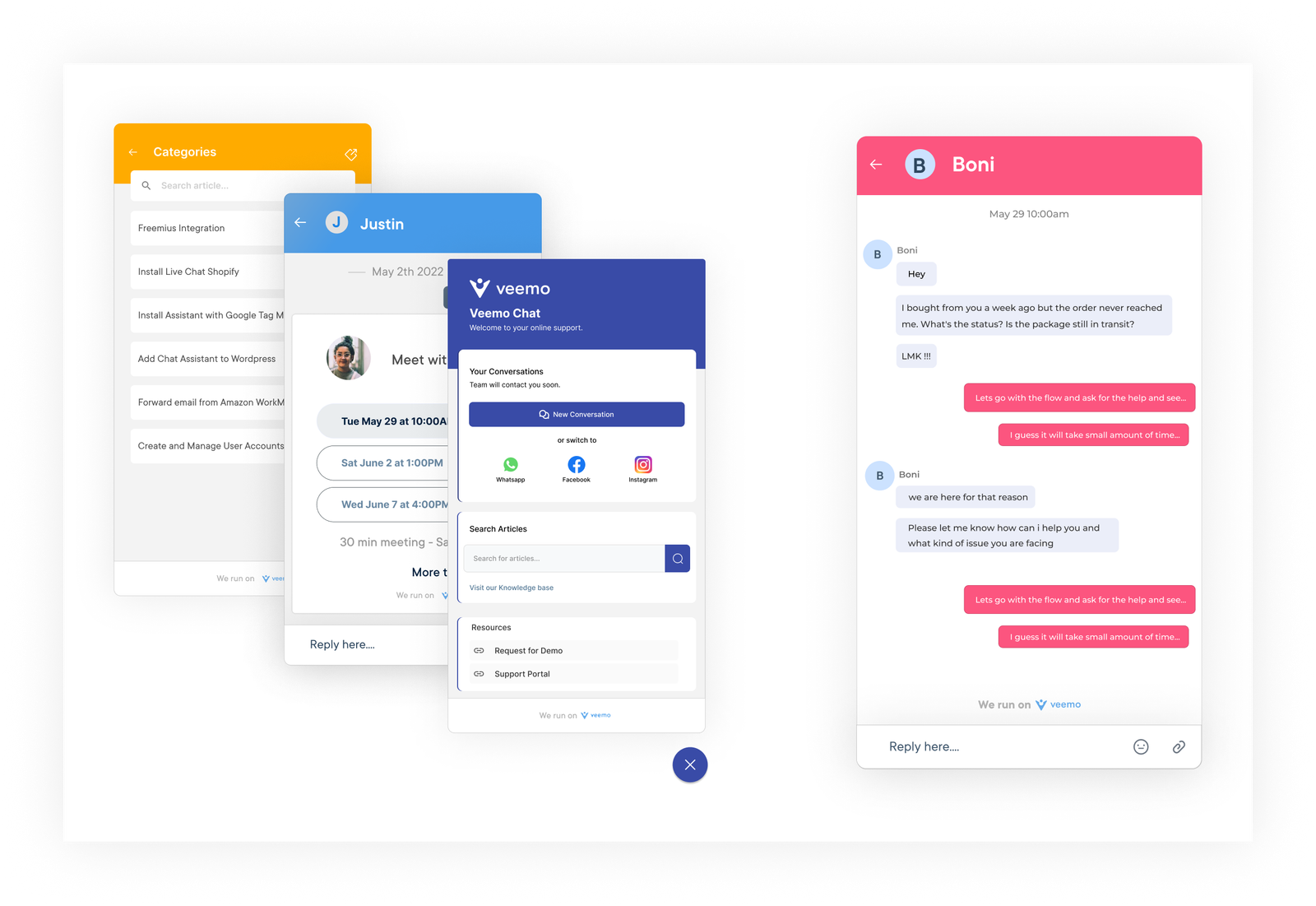
Veemo is a comprehensive customer service platform that offers a wide range of features to help businesses provide exceptional customer support. Live chat and email management to social media integration, Veemo is designed to enhance the customer service experience.
Key Features:
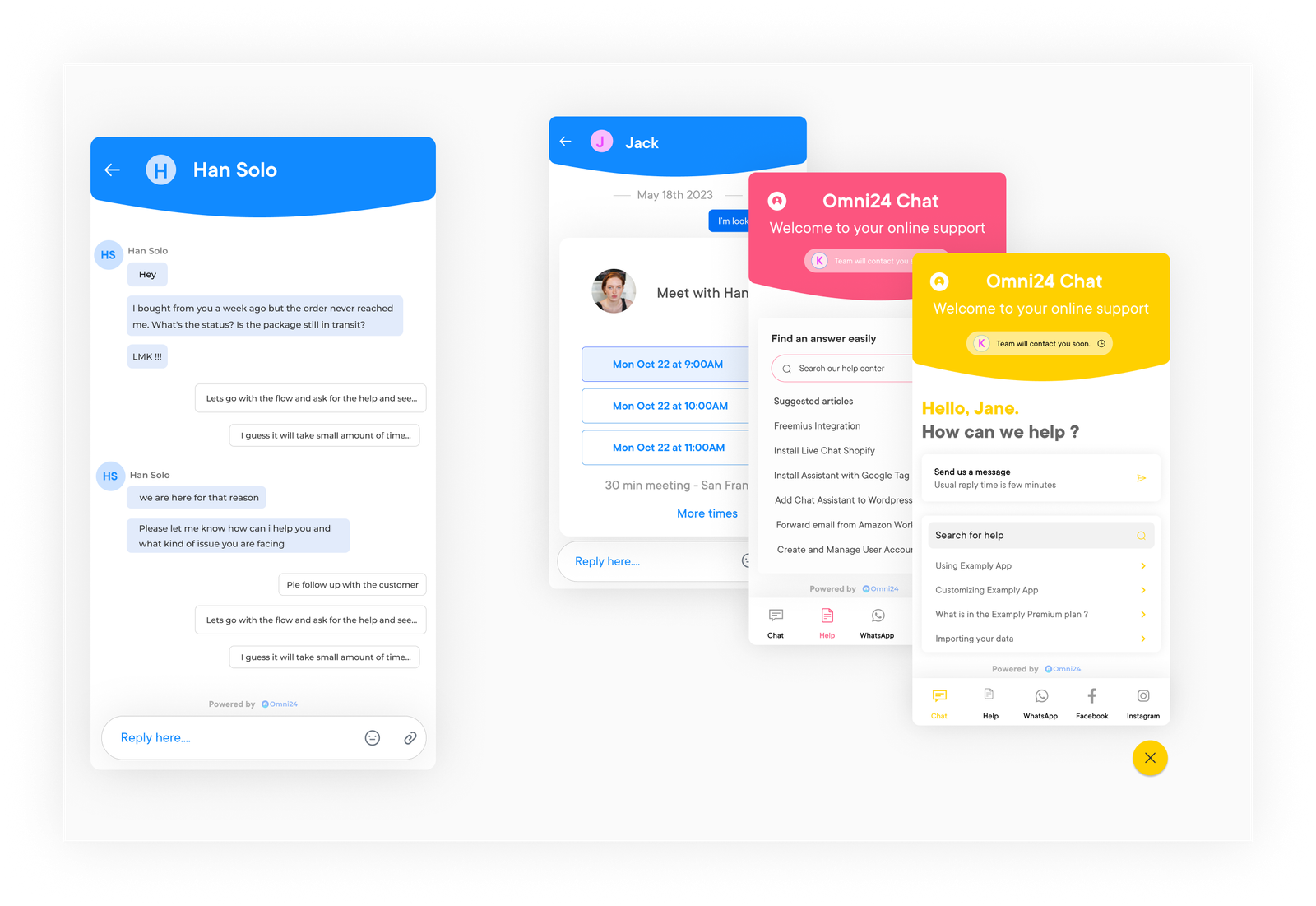
Omni24 is a powerful customer service tool that is essential for any ecommerce business looking to provide top-notch customer support. The cloud-based platform offers a range of features designed to streamline communication with customers and enhance the overall shopping experience.
Key features:
Live chat support: Omni24 offers a live chat feature that allows customers to connect with support representatives in real-time.
Ticketing system: The ticketing system in Omni24 enables businesses to track and manage customer inquiries efficiently. Support agents can categorize and prioritize tickets based on urgency, ensuring no customer concern goes unanswered.
Knowledge base: Omni24 includes a knowledge base feature that allows businesses to maintain a database of frequently asked questions and support articles.
Omnichannel support: Businesses can provide support across multiple channels, including email, live chat, social media and phone.
Reporting and analytics: Omni24 offers robust analytics tools that provide valuable insights into customer interactions and support team performance.
Zendesk is a popular customer service platform that allows businesses to manage customer inquiries from multiple channels such as email, chat, phone and social media. It also offers features like ticketing systems, knowledge bases and chatbots to streamline customer interactions.
LiveChat is a live chat software that allows businesses to provide instant customer support on their website. Features like chat routing, canned responses and chat transcripts allow LiveChat to make it easy to provide personalized assistance.
Implementing seamless ecommerce customer support is essential in elevating the customer service experience. Providing efficient assistance to customers throughout their online shopping journey allows businesses to build trust, loyalty and satisfaction. Utilizing tools such as live chat, chatbots and self-service options can streamline the customer service process. It ensure timely resolutions to inquiries and issues.
Investing in training for support staff and keeping up with the latest technology trends can further enhance the ecommerce support experience. Prioritizing customer service in the digital realm can lead to increased sales, positive brand reputation and long-term success for any business.
Explore the crucial role of ecommerce customer service. Learn strategies to enhance customer satisfaction, promoting growth and success in online retail.

Ecommerce customer service differs from brick-and-mortar in terms of its focus on virtual interactions rather than face-to-face interactions. Ecommerce customer support relies heavily on online communication channels such as chatbots, email and social media. Brick-and-mortar customer service involves in-person interactions with customers. Ecommerce customer service often requires quicker responses due to the fast-paced nature of online shopping.
Customer service in ecommerce is typically provided through various channels such as live chat, email, phone support and social media. Ecommerce companies focus on delivering quick responses, personalized assistance and resolving customer issues efficiently. They also use chatbots and self-service options to enhance the customer service experience. The goal is to ensure customer satisfaction and loyalty.
Improving online ecommerce customer service can be achieved by offering 24/7 support, responding promptly to inquiries, providing multiple communication channels and collecting feedback for continuous improvement. Prioritizing customer satisfaction and making their shopping experience seamless allows businesses to enhance their online ecommerce customer service.
Multi-channel ecommerce customer service refers to providing customer support across various platforms such as websites, social media, email and phone. It allows businesses to engage with customers on their preferred channels, offering a seamless and consistent experience. Utilizing multiple communication channels allows businesses to enhance customer satisfaction and build stronger relationships with their customers.
Several tools are essential to provide effective ecommerce customer service. Live chat software, help desk ticketing systems, CRM software and social media monitoring tools are crucial for managing customer inquiries. Email automation tools, knowledge base software and feedback management tools can help improve customer satisfaction.
Market better, sell faster and support smarter with Veemo’s Conversation Customer Engagement suite of products.
Unify all your customer data in one platform to deliver contextual responses. Get a 360 degree view of the customer lifecycle without switching tools.
Connect with the tools you love to reduce manual activities and sync your business workflows for a seamless experience.
 https://veemo.io/wp-content/uploads/2024/06/Customer-Service-vs-Customer-Experience.png
628
1200
Vikas Sachan
https://veemo.io/wp-content/uploads/2024/11/veemo.svg
Vikas Sachan2024-12-03 10:49:362024-12-03 10:49:36Customer Service vs Customer Experience: What’s The Difference?
https://veemo.io/wp-content/uploads/2024/06/Customer-Service-vs-Customer-Experience.png
628
1200
Vikas Sachan
https://veemo.io/wp-content/uploads/2024/11/veemo.svg
Vikas Sachan2024-12-03 10:49:362024-12-03 10:49:36Customer Service vs Customer Experience: What’s The Difference?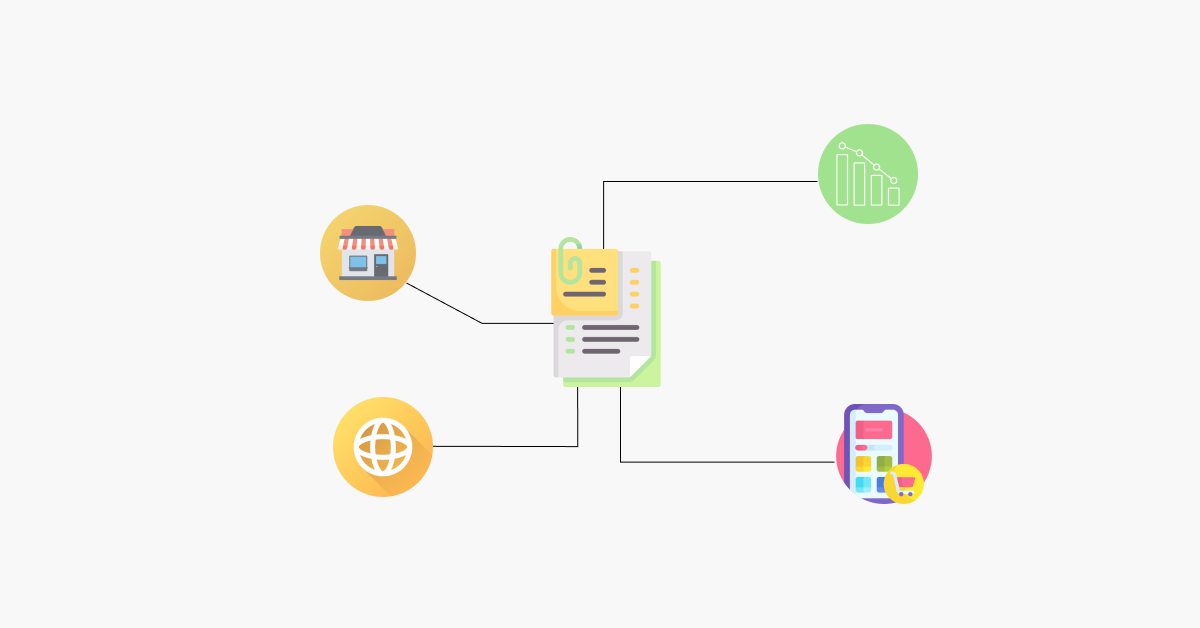 https://veemo.io/wp-content/uploads/2024/03/Omnichannel-Customer-Experience.png
628
1200
Harsh Patel
https://veemo.io/wp-content/uploads/2024/11/veemo.svg
Harsh Patel2024-11-11 08:27:222025-01-31 04:07:29What is Omnichannel Customer Experience? Benefits, Examples & Tools
https://veemo.io/wp-content/uploads/2024/03/Omnichannel-Customer-Experience.png
628
1200
Harsh Patel
https://veemo.io/wp-content/uploads/2024/11/veemo.svg
Harsh Patel2024-11-11 08:27:222025-01-31 04:07:29What is Omnichannel Customer Experience? Benefits, Examples & Tools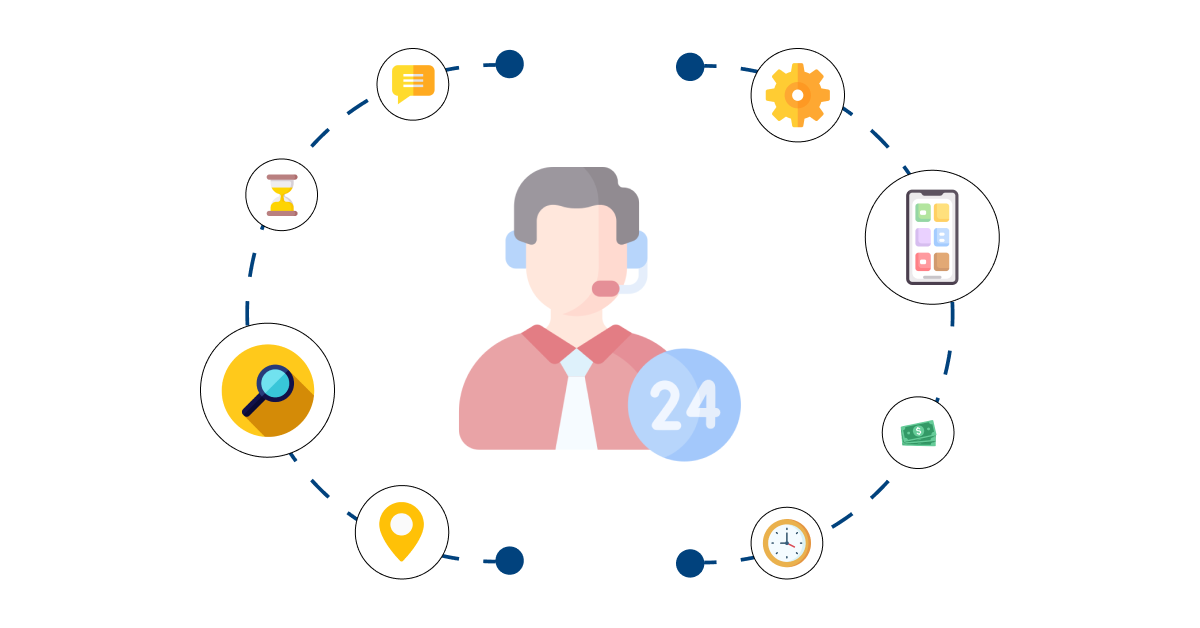 https://veemo.io/wp-content/uploads/2024/06/Customer-Service-Workflows.png
628
1200
Vikas Sachan
https://veemo.io/wp-content/uploads/2024/11/veemo.svg
Vikas Sachan2024-11-05 06:59:402024-11-05 06:59:40Customer Service Workflows and How to Build Them
https://veemo.io/wp-content/uploads/2024/06/Customer-Service-Workflows.png
628
1200
Vikas Sachan
https://veemo.io/wp-content/uploads/2024/11/veemo.svg
Vikas Sachan2024-11-05 06:59:402024-11-05 06:59:40Customer Service Workflows and How to Build ThemGrow Customer Relationships and stronger team collaboration with our range of products across the Conversational Engagement Suite.

 14 Invaluable Tools And Customer Service Resources
Scroll to top
14 Invaluable Tools And Customer Service Resources
Scroll to top